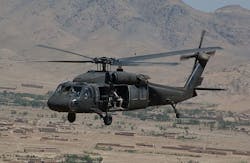Aurora Flight Sciences moves to next phase of DARPA aircraft automation project
ARLINGTON, Va., 27 Aug. 2015. Avionics designers at Aurora Flight Sciences Corp. in Manassas, Va., are moving forward with a U.S. defense research program to develop and insert new aircraft automation into existing planes and helicopters to enable operation with reduced onboard crew.
Officials of the U.S. Defense Advanced Research Projects Agency (DARPA) in Arlington, Va., announced a $15.4 million contract modification to Aurora Flight Sciences on Wednesday to begin the second phase of the Aircrew Labor In-Cockpit Automation System (ALIAS) program.
Aurora Flight Sciences won an initial $6 million phase-one DARPA ALIAS contract in December 2014 to capitalize on advances in aircraft automation, such as optionally piloted aircraft and remotely piloted aircraft, to help reduce pilot workload, augment mission performance, and improve aircraft safety.
Sikorsky Aircraft Corp. in Stratford, Conn., won a $9.8 million contract modification last week for the second phase of the DARPA ALIAS program. Sikorsky engineers will conduct flight demonstrations of the Autonomous Crew Enhancement System (ACES) cargo-resupply mission on the UH-60L helicopter, as well as demonstrate the ACES system on a representative fixed-wing aircraft, DARPA officials say.
Related: The critical value of human intelligence in the cockpit
Lockheed Martin Corp. also is working on the first phase of the DARPA ALIAS program.
For ALIAS phase-one, Aurora worked with the National Robotics Engineering Center in Pittsburgh and the Duke Engineering Research Institute in Durham, N.C., to develop an automated assistant able to operate an aircraft from takeoff to landing.
The assistant automatically executes flight and mission activities, checklists, and procedures, while detecting and responding to contingencies, Aurora officials say. The system informs the human pilot about actions the automated assistant is taking, and enables the human take back control when necessary.
In the second phase of ALIAS, Aurora engineers will focus on refining the overall ALIAS system, reducing risks, demonstrating rapid installation time, and conducting additional in-flight demonstrations.
In DARPA ALIAS phase-two, Aurora experts also will refine subsystems and demonstrate the overall system on a third aircraft, a Sikorsky UH-60 military helicopter.
The objectives of ALIAS phase two are to enhance and mature the phase-one system to support flight tests, enhance the usability and robustness of the human interface, and demonstrate system portability on the ground.
On this contract modification Aurora Flight Sciences will do the work in Manassas, Va.; Pittsburgh; and Durham, N.C., and should be finished by December 2016. For more information contact Aurora Flight Sciences Aircraft online at www.aurora.aero, or DARPA at www.darpa.mil.

